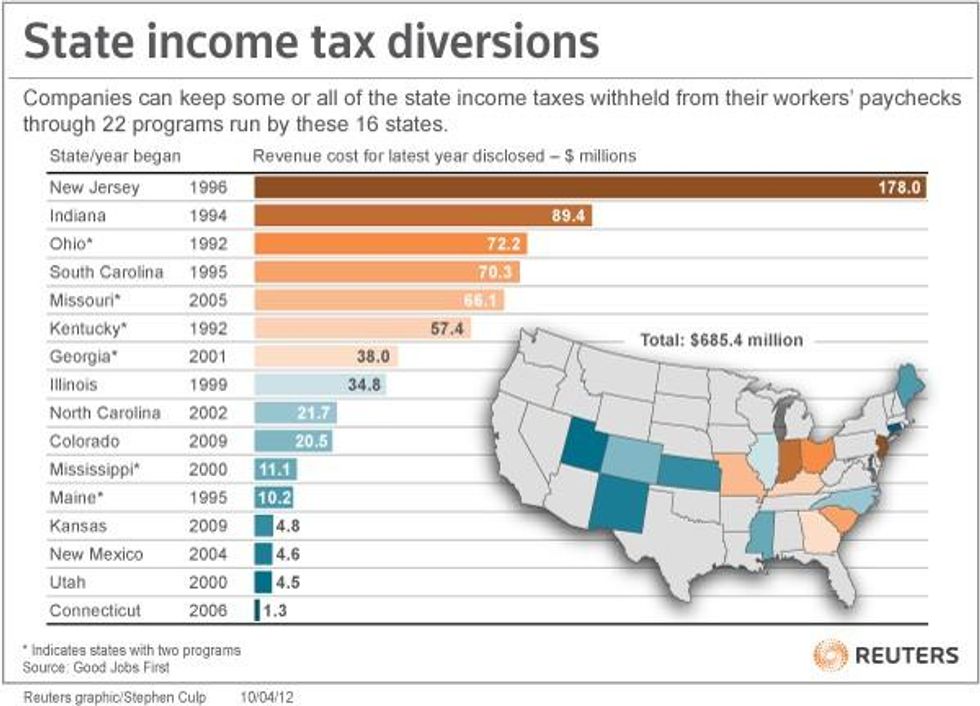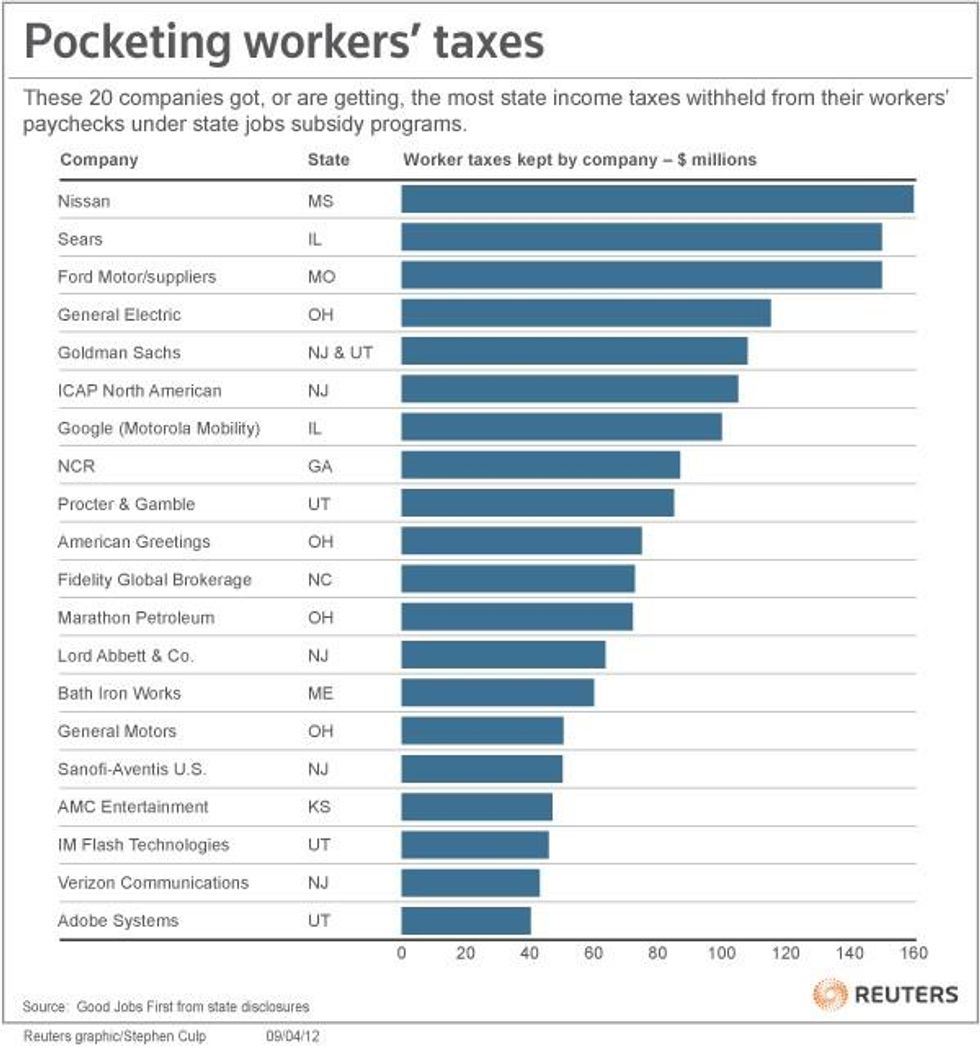Across the United States more than 2,700 companies are collecting state income taxes from hundreds of thousands of workers - and are keeping the money with the states' approval, says an eye-opening report published on Thursday.
The report from Good Jobs First, a nonprofit taxpayer watchdog organization funded by Ford, Surdna and other major foundations, identifies 16 states that let companies divert some or all of the state income taxes deducted from workers' paychecks. None of the states requires notifying the workers, whose withholdings are treated as taxes they paid.
General Electric, Goldman Sachs, Procter & Gamble, Chrysler, Ford, General Motors and AMC Theatres enjoy deals to keep state taxes deducted from their workers' paychecks, the report shows. Foreign companies also enjoy such arrangements, including Electrolux, Nissan, Toyota and a host of Canadian, Japanese and European banks, Good Jobs First says.
Why do state governments do this? Public records show that large companies often pay little or no state income tax in states where they have large operations, as this column has documented. Some companies get discounts on property, sales and other taxes. So how to provide even more subsidies without writing a check? Simple. Let corporations keep the state income taxes deducted from their workers' paychecks for up to 25 years.
It was not always this way. Letting companies keep their workers' state taxes apparently began in Kentucky two decades ago as a way to retain jobs.
Last July when I wrote about six big companies that pocket Illinois state taxes I knew there was more to this. But I had no idea how pervasive these diversions were until I read an advance copy of the 39-page report by Good Jobs First.
Corporate Socialism
Deals cut with the states over the past two decades diverted $5.5 billion from public purposes to private gain, the report says. Close to $700 million more was diverted last year, Good Jobs First estimates.
New Jersey approved $73.2 million in new deals in 2011 on top of $178 million diverted that year alone under previous deals. I calculate that at nearly $80 per household in corporate welfare based on New Jersey's 3.1 million households.
These deals typify corporate socialism, in which business gains are privatized and costs socialized. They also mean government picks winners and losers, interfering with competitive markets. Leaders in both parties embrace these giveaways because they draw campaign donations from corporate interests and votes from people who do not understand that they are subsidizing huge companies.
Michael Press, a Connecticut consultant on tax incentives, says such deals, however troubling, are an inevitable result of the U.S. Constitution setting up competition between the states.
"In an ideal world we would not provide any corporate subsidies," Press told me. "It looks like corruption. But if you do it right, if you only target those companies whose behavior you change to create jobs or keep jobs in your state then these targeted temporary arrangements are cheaper - much cheaper - and can be more effective than an overall reduction in tax rates."
The mission of Good Jobs First is making economic development subsidies accountable and effective. In years of working with their data I have always found it sound. While Greg LeRoy, Good Jobs First's founder, has rooted out all sorts of hidden subsidies over the years, he emphasizes that he is not inherently hostile to them, only to secrecy, waste and what he calls job piracy and job blackmail.
"Job piracy" occurs when one state diverts taxes to lure an employer across state lines. AMC Entertainment announced a deal last year to move its corporate headquarters from Kansas City, Mo., to a nearby Kansas suburb. In return, Good Jobs First said, Kansas will let the multiplex chain keep $47 million of state income taxes withheld from its workers' paychecks, a drain on public finances that did not create any jobs, but does enrich the Wall Street firms that own AMC including arms of J. P. Morgan, Apollo Management, Bain Capital and the Carlyle Group. AMC declined to answer my questions.
"Job blackmail" occurs when a company threatens to close a plant unless it gets tax money.
In Illinois, the law requires companies to threaten to leave before they can keep taxes withheld from paychecks. Motorola Mobility, now being acquired by Google; the truck maker Navistar; the German manufacturer Continental Tire, and three auto makers - Chrysler, Ford and Mitsubishi - get to keep $346.8 in taxes over 10 years because they threatened to leave Illinois. Navistar can pocket $62.1 million even if it fires a quarter of its Illinois workforce, its contract shows. A recent deal gives Sears $150 million, Good Jobs First reported.
Promises of Jobs
Promising to retain jobs can be lucrative. General Electric invested $126 million updating part of its Ohio operations. In return, GE gets a tax credit equal to $115.3 million of its worker taxes, recovering 92 percent of its investment. A sweet deal for GE, but not its competitors.
Gary Sheffer, GE's top spokesman, said the company told its workers about the deal. In all, he said, GE is investing around $300 million in Ohio and "the resulting taxes the state will receive will far exceed the tax credits provided to GE."
That response, I think, misses the point - GE should pay its own bills without taking welfare.
Many figures in the Good Jobs First report are from disclosure reports some states make. Others come from news accounts and company announcements.
Total revenue losses are higher than the report states. First, some states hide the costs. Phil Mattera, the research director at Good Jobs First, said he lists the cost as zero for states that hide the numbers.
Good Jobs First wants to end these diversions, but failing that recommends mandatory disclosure to the workers as the first reform. I concur. It's the first step in ending corporate welfare as we know it.




